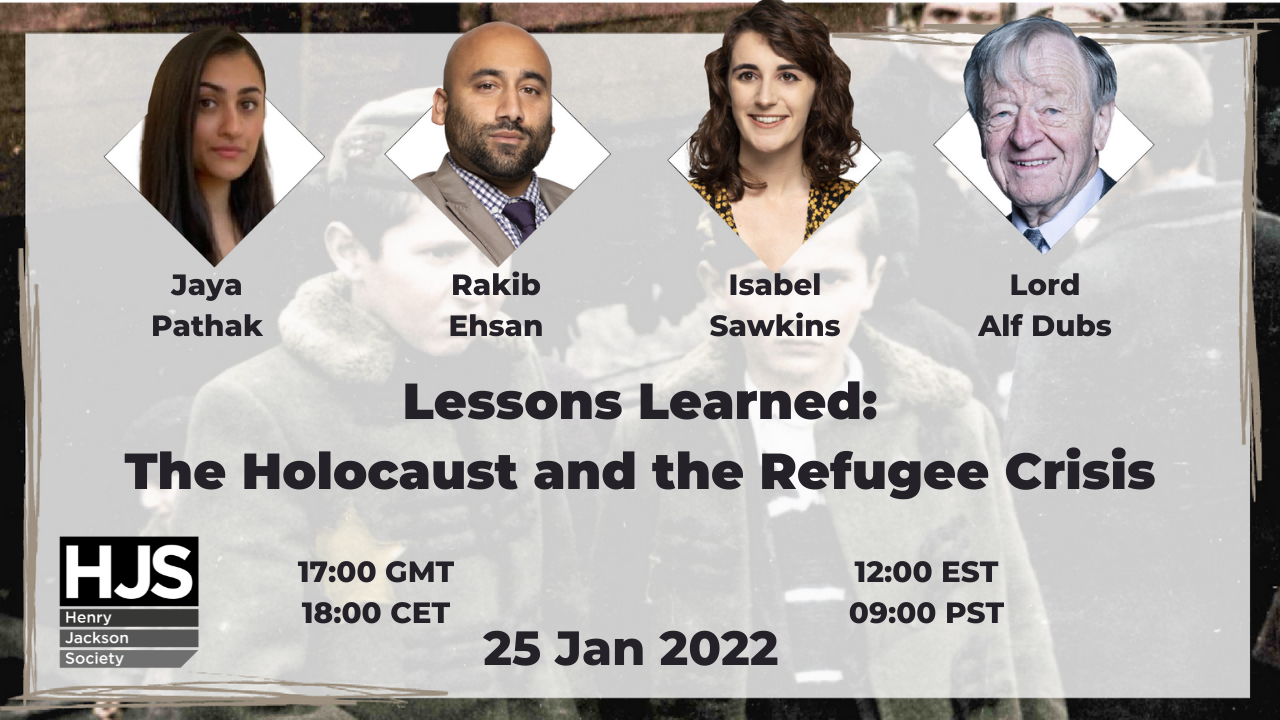Lessons Learned – The Holocaust and the Refugee Crisis

- This event has passed.
Lessons Learned – The Holocaust and the Refugee Crisis
25th January 2022 @ 5:00 pm - 6:00 pm

What lessons can we glean from past atrocities such as the Holocaust, and apply to contemporary crises – whether they be other genocides, or the ongoing global refugee crisis?
In the wake of anti-Semitic violence co-ordinated by the Nazi regime in Germany, the British government allowed unaccompanied minors under the age of 17 to enter Great Britain as refugees. This organised rescue effort has come to be termed as the ‘Kindertransport’. Upon their arrival in Britain, child welfare organisations arranged for the children’s care, education, and eventual emigration from Britain. In the period between December 1938-May 1940, these efforts brought around 10,000 children to safety.
Can this example of Britain providing safety for thousands of Jewish children be applied to crises today? Or, is it unhelpful to apply history to contemporary affairs given changing context and circumstance? The Henry Jackson Society is delighted to gather this panel to discuss how useful historical analogies are, and whether history can be used as a guide for future action.

Lord Alf Dubs is a Labour politician and leading refugee rights advocate. Formerly the MP for Battersea and Director of the Refugee Council, Alf was appointed as a Labour life peer in 1994. In 2016, he sponsored an amendment to the Immigration Act 2016 to offer some unaccompanied refugee children stranded in camps in Europe safe passage to Britain, having himself arrived in Britain in 1939 as a six-year-old refugee fleeing the Nazis in Czechoslovakia.
Alf believes the Nationality and Borders Bill which is currently making its way through parliament will further weaken the rights of refugees, especially children, will breach the 1951 Convention on Refugees and will, regrettably, encourage people traffickers. He opposes the Bill and will seek to amend it.

Dr Rakib Ehsan is a research fellow who sits in both the Henry Jackson Society’s Centre on Radicalisation & Terrorism (CRT) and Centre on Social & Political Risk (CSPR).
He holds a BA in Politics & International Relations (First-Class Honours), MSc in Democracy, Politics and Governance (Pass with Distinction), and a PhD in Political Science, all obtained from Royal Holloway, University of London. His PhD thesis, which was comprehensively sponsored by the Economic & Social Research Council (ESRC), investigated the impact of social integration on the public attitudes of British non-white ethnic minorities.
Rakib has authored articles on asylum system reform for publications such as The Daily Mail, The Telegraph, The Spectator, CapX and Sp!ked.

Jaya Pathak is Co-Executive Director of Yet Again UK and Co-Chair of the student wing of the UK national campaign group Stop Uyghur Genocide, called Students for Uyghurs. Jaya has been involved in human rights activism for many years, currently centred around advocacy and with a background in genocide education. Jaya is a Regional Ambassador with the Holocaust Education Trust, having volunteered with the charity for almost 7 years. Jaya is also undergoing a degree in Pharmacy and is Programs Assistant at Arise Foundation, an anti-slavery and human trafficking organisation working across the world to protect communities from exploitation.

Isabel Sawkins is a Research Fellow at the Henry Jackson Society. She has a BA in Modern Languages at Durham University and an MA in Political Sociology of Russia and Eastern Europe at UCL. She is currently completing a PhD on Holocaust memory in the Russian Federation at the University of Exeter, funded by the South West and Wales Doctoral Training Partnership (part of the Arts and Humanities Research Council). Isabel has presented her research at numerous international conferences. She has also published her findings in academic journals, as well as contributing to online media outlets. Isabel’s most recent accomplishment was the curation of an online exhibition about a Nazi death camp in occupied Poland.
This event is co-sponsored by the Association of Jewish Refugees
***
SUMMARY
On the 25th of January 2022, Isabel Sawkins, Research Fellow at the Henry Jackson Society, Baron Alfred Dubs, member of the House of Lords, Dr Rakib Ehsan, Research Fellow at the Henry Jackson Society, and Jaya Pathak, Co-Executive director of Yet Again UK, discussed the relevancy of past atrocities and responses to it, such as the Holocaust and Kindertransport, to current British refugee policy and whether it is helpful to apply history to contemporary issues.
Isabel Sawkins began the discussion by introducing the speakers and topic and inviting Alex Maws to speak on behalf of the co-sponsor of this event, The Association for Jewish Refugees. He gave a brief history of the charity and its current activities in supporting Holocaust education initiatives and remembrance. Baron Dubs then spoke on the importance of making sure the Holocaust is still remembered and his efforts to support child refugees getting to the UK and the need for broad political engagement. Dr Ehsan spoke about the need to have a hard-headed approach to the Asylum system as well as the importance of prioritising who should be given asylum, in order to maintain public confidence. Jaya Pathak hen spoke about her own experience coming from a family of refugees. She also argued that the government should do more to hold countries like China to account over human rights abuses.
The discussion ended with a series of questions about the need to accommodate environmental refugees, the best ay to integrate refugees and how to use education to tackle the fear of the other.


